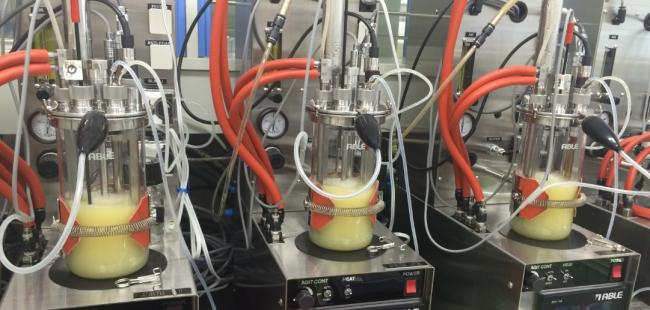Isoprene sourced from biomass – Yokohama Rubber announces new technology
 Isoprene is synthesised in an in-cell (in vivo) process
Isoprene is synthesised in an in-cell (in vivo) process
Five years of joint research has led to a breakthrough in the production of synthetic rubber. Yokohama Rubber says it has developed the world’s first technology for efficiently producing isoprene from a biomass, and by doing so reduces dependence on petroleum.
Isoprene is a raw material found in synthetic rubber (polyisoprene rubber) used in tyres and other applications. Conventional industrial isoprene is produced as a by-product of naphtha pyrolysis.
Yokohama Rubber’s breakthrough stems from joint research with Riken and Zeon Corporation. The three parties began their joint research in 2013, and two years later discovered a new isoprene-synthesising process using a computer-based in-silico metabolic design technology (a technology for designing new artificial metabolic reactions on computers). Further development of this new technology has led to the creation of cells that synthesise isoprene very effectively thanks to a new artificial pathway and highly active enzymes.
Using the aforementioned technology, the researchers created cells with an in vivo capability to generate isoprene from a biomass (sugar) starting material. The in vivo generated isoprene is then polymerised to achieve synthesis of polyisoprene rubber. The research leading to this new technology took advantage of the cell design and plant science technologies of the Riken Center for Sustainable Resource Science (CSRS).
It is widely understood that isoprene is produced naturally from mevalonic acid (an intermediate substance formed from sugar) through a five-stage reaction, but the new artificial pathway constructed through the joint research reduces that process to two stages. Furthermore, the highly active enzymes possess a phenomenal isoprene-producing capability that can’t be achieved by natural enzymes. Introducing this artificial pathway and these enzymes into colon bacilli gives the bacteria an isoprene-generating ability that it lacks in nature and enables an efficient artificial synthesis of isoprene. Yokohama Rubber has confirmed that this technology can also be applied to butadiene-based synthetic rubber and other diene rubbers.
Riken is Japan’s only comprehensive research institution for the natural sciences. The Riken CSRS is dedicated to the realisation of a sustainable society through its research in the field of biological functions, especially its basic research on the effective use of plant-microorganism bioprocesses. Zeon, a manufacturer of synthetic rubbers, places its research emphasis on polymerisation catalyst technology and enhancing the performance of synthetic rubbers.



Comments